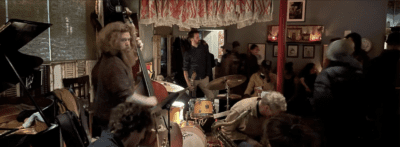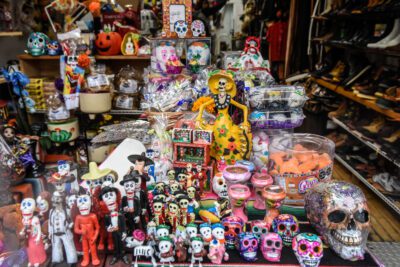Photo by Emma Pion-Berlin
How Mercado Global got 120,000 masks into at-risk communities
The Brooklyn-based nonprofit works with rural women in Guatemala to make and sell hand crafted accessories

Ruth Alvarez DeGolia
While the rest of us may have spent 2020 sitting around on our phones (sorry if we’re projecting), Brooklyn-based nonprofit Mercado Global provided rural women in Guatemala with income and resources by selling their locally made accessories—at scale.
Mercado Global’s purses, scarves, and belts—made by indigenous women—have earned spots on the shelves of big-name retailers including Levi’s and Reformation. “We don’t do apparel,” says founder and executive director Ruth Alvarez DeGolia. “We really focus on accessories [where] special craftsmanship can shine.”
But last year tested the nonprofit. Mercado Global pivoted, launching a buy-one get-one mask donation project called “Masks Where They’re Needed Most,” which put 120,000 masks on the faces of at-risk communities in New York, across the U.S., and abroad.
While its name hints at global reach, Mercado Global calls Sunset Park’s Industry City home. Brooklyn Magazine sat down with founder and executive director Ruth Alvarez DeGolia to chat about the past, present and future of ethical fashion in our shrinking world. This interview has been edited for readability.
You guys are global, but let’s start locally: Why Industry City?
Industry City is a place that feels so in line with who we are as a brand and as an organization. It’s diverse, multicultural, and exciting. It’s right in the heart of a really big Hispanic community in Brooklyn. It feels really much in line with what we’re all about—which is this idea that Guatemala is our neighbor, and there are so many ties that connect us culturally and economically. And it’s usually really hard to get clients in the fashion industry to travel to Brooklyn for a meeting. Industry City seems to be the one place they’re willing to come.
Last year you helped produced 120,000 masks by and for at risk women. What’s in store for 2021?
We are really focused on expanding our impact. With our Masks Where They’re Needed Most campaign, one of the things that has really stood out for us is how interconnected these communities are. The racial justice movement over the last year caused so many people who weren’t thinking about issues of racial justice as frequently or as deeply as they were before to recognize it within their own lives or businesses. More companies, in the fashion industry especially, are starting to think, “Oh wow, maybe we should start sourcing from companies and social enterprises that empower women of color.”
Talk about combining designs that highlight indigenous, artisanal weaving techniques while also partnering with big brands like Levi’s—what’s that balance and relationship like?
Some companies might want to say that they work with artisans but are maybe not really committed to making it a core part of their supply chain. Our role at Mercado Global is figuring out how to make that connection successful. So for example, we don’t do apparel. We really focused on accessories, smaller pieces where really time-intensive and special craftsmanship can shine, at an affordable price point for consumers. Retailers can use their massive market share to increase sustainable products that have a positive social impact and at the same time, help these indigenous women leverage their heritage techniques and gain real, serious income that allows them to send their kids to school and provide a better future for their families.
You guys are putting women into typically male-dominated managerial roles. How has that been for the women you work with? Have you been met with any resistance?
We only work with women’s co-ops, not with individuals. There are a lot of reasons why we do that, but one is that we can’t be in our partner communities all the time. There’s so many challenges that the women we work with face–domestic violence is a really big one of them. Since we can’t be there all the time, the support network that women get from working with a co-op [gives them] that opportunity, even to leave their house weekly, to meet with co-op members.
How has the political landscape affected your work, if at all?
Guatemala is closer to New York than L.A. is to New York. The idea that this is someone else’s problem is just not true. One tenth of all Guatemalans live in the United States. For the first three weeks in March, there were no documented cases of coronavirus in Guatemala. Then what happened was, even though the Guatemalan government closed the airport to all international travel in mid-March, the Trump administration basically threatened a trade war unless they allowed them to continue sending flights of deported migrants to Guatemala. Of course it turns out everyone was infected with coronavirus when they landed. This is a region that has no health infrastructure, with multi-generational families living in one- or two-room homes. It was so unnecessary and so obvious to everyone why it happened. And Guatemala was on a multi-month total lockdown, which led to really extreme hunger.
How did that all affect you?
We had all these plans for the year. We had really big spring 2020 collection orders that were being produced. We felt such a responsibility to help the communities we serve in Guatemala get through, but also to help the global community that supported us for so many years. Now we’ve donated 120,000 masks, half to NYC nursing homes and then migrant workers and indigenous communities throughout America. We had such an outpouring of support from NYC, our corporate partners, financial institutions. Finding ways to provide added value to our network has been so key to helping us get through.
Let’s look backwards: How has Mercado Global changed in your 17 years there?
We’ve come very far! We started working with three co-ops and we work with over 70 now. I remember meeting with large retailers and them saying, “Oh that’s so cute you work with moms in the mountains but you couldn’t possibly work with us.” It’s exciting that now we work with Target, Nordstrom, Shopbop, Levis, Free People, Anthropologie, all these big retailers.
What’s your own go-to piece of Mercado Global merch?
I love our crossbodies. I love having an everyday bag that has lots of functionality—lots of little pockets and zippers! It also has this beautiful fabric and you know there’s an amazing story behind it. Everywhere I go people ask me about the story behind it.
You might also like 


























